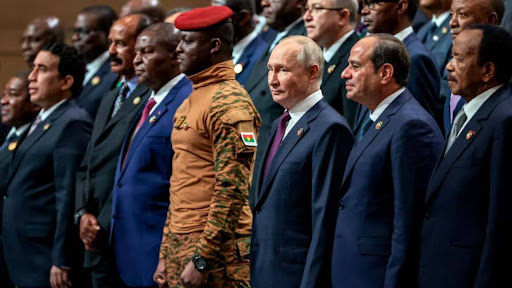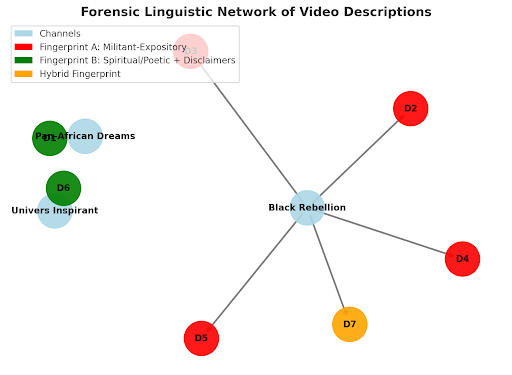The Deepfakes Moving Africa Carry European Fingerprints
A wave of emotive deepfake speeches targeting Africans hit the internet in May. Investigations have now linked them to Europe.

“So what?” Richard Martin, a US-based pan-Africanist, shot back on LinkedIn, dismissing another user who dared to call a trending speech of Burkina Faso’s military leader, Captain Ibrahim Traoré, by its real name: a deepfake.
It was the kind of fiery anti-imperialist speech delivered by Muammar Gaddafi at the United Nations in 2009.
“You ask, ‘Why is Africa poor?’ That’s the wrong question,” Traoré tells the big news companies in crisp, accented English. “The real question is, how is Africa kept poor when it’s so rich?”
Patti Boulaye, a British-Nigerian singer and actress, shared it on LinkedIn, lending it an aura of authenticity. Many of the over 300 comments under her post on the social media platform echoed her conviction that the speech was real. Another sizable fraction recognised it as fake but embraced it anyway. Among those who raised concerns was London-based IT training consultant Adrian Moore, who was quickly pushed back by Richard: So what?
Undeterred by criticism, Patti, who, according to her LinkedIn bio, leads a fundraising effort to build healthcare clinics and a school in some African countries, posted yet another AI-generated speech.
“All I ask is that you do not throw away the baby with the bath water,” she wrote.
The new video shows the same man in his signature brownish camouflage, speaking on a global podium. Like the first, which was reposted over 250 times and received reactions from more than 1,300 users, the second video also went viral.
Captain Traoré seized power in Burkina Faso on September 30, 2022, citing military leader Paul-Henri Damiba’s failure to curb an escalating Islamic insurgency, and pledged to restore democracy within two years. But as the deadline approached, he extended his rule by five more years, cementing his place as president of the Francophone nation.
In office, Traoré has overseen notable agricultural and industrial initiatives, while also drawing international criticism. In May, Burkina Faso’s military was accused of killing at least 130 civilians in Solenzo, a town in the country’s west.
His rule has been marked by bold geopolitical shifts: withdrawing from the Economic Community of West African States (ECOWAS), forging a new alliance with other military-led neighbours, severing ties with France, and deepening relations with Russia.
A dictator loved by some and criticised by others across borders, Traoré’s complex personality made him a tool of choice in the deepfake videos now making the rounds in Africa.
Many of them hit the internet in May, attributed to Traoré and conveying similar messages – Africa, a historical victim of Western exploitation, must deliver itself.
The videos appear to premiere on YouTube before spreading to social media platforms like TikTok, Facebook, and LinkedIn. The responses, from thousands of people, are often the same: tears, admiration, accolades, as well as scepticism.
“This is not a simple speech, it’s rather a textbook of freedom for Africa,” one YouTube comment reads.
The numerous fact-checks that followed, proving the videos are synthetic, could not stop the people from believing them.
One, “President Ibrahim Traoré’s Bold Speech to the IMF Shocks the West,” has got close to 1.5 million YouTube views, while “Africa Will Not Kneel: Traoré’s UN Speech Shocks the West and Defies Neocolonial Power” has over 600,000. Now deleted by YouTube, “Pope Leo XIV Responds to Captain Ibrahim Traoré| A Message of Truth, Justice & Reconciliation” was streamed nearly a million times. Its description as “a work of fiction inspired by the life of IBRAHIM TRAORÉ” had little effect on the thousands who flooded the comment section.
“They sound like what leaders should say but seldom dare to,” Ghanaian strategic communicator Rifkin Dodo said of the moving speeches.
Yaw Kissi, a pan-African writer popular on LinkedIn, shares the same view: “When people hear voices, even artificial ones, boldly articulating what they’ve always felt but rarely heard echoed, it sparks something powerful.”

Where are they from?
Because of their anti-West rhetoric and pan-African posture, the biggest bet would be that these speeches originated in Africa itself. Yet an in-depth analysis of seven of them, collected from different YouTube channels, tells a different story.
The earliest uploads can be traced to three channels: Pan-African Dreams, Black Rebellion, and Univers Inspirant. The latter two were both created in March this year. Though Pan-African Dreams, which premiered the viral deepfake of the newly-inaugurated head of the Catholic Church, Pope Leo XIV, responding to Traoré, has since been deleted by YouTube, archived records show it shared the same “Welcome to …” opening line in its page description as the other two.
Labelled D1 through D7, metadata extracted from the three channels was subjected to forensic linguistic analysis, using advanced AI language models.
An analysis of authorship and voice, lexical patterns, and stylistic markers revealed overlaps suggesting the channels are from one source:
Black Rebellion and Univers Inspirant both joined YouTube…in March 2025, within 9 days of each other.
Pan-African Dreams shares the same “Welcome to …” channel intro formula despite deletion.
All seven videos were released within 10 days (May 15–24, 2025) — a compressed schedule suggesting a campaign roll-out rather than organic posting.
While Black Rebellion chose a different core style, Pan-African Dreams and Univers Inspirant share the same linguistic fingerprint in their video descriptions. In one instance, Black Rebellion merged the styles of the other two channels.
This pattern implies one production team testing multiple rhetorical frames (religious/spiritual, militant/anti-colonial, media-critique) to maximise resonance across audiences.

YouTube transcripts of two videos from Black Rebellion and Univers Inspirant were also subjected to a similar analysis:
The core linguistic fingerprint—the ideology, the confrontational pronoun strategy, the complete lack of filler words, the passionate tone, and the reliance on specific rhetorical patterns—is remarkably consistent across both texts.
The significant differences in structure, pacing, and lexical focus are best explained not by a change in author but by a deliberate and skilful adaptation to audience and medium.
The underlying idiolect is the same; only the presentational style has been modified to fit the specific context.
Surprisingly, Black Rebellion and Univers Inspirant are both located in France, prompting an AI model to conclude:
The timing, registration, style overlaps, disclaimers, and cross-channel duplication all strongly suggest that Pan-African Dreams, Black Rebellion, and Univers Inspirant are not independent outlets but rather part of a single coordinated network, seeded from France in March 2025, with the May videos representing a first major campaign wave.

Truths, lies, and half-truths
Richard repeated the same statement many times under Patti’s post: It’s absolutely true. Like him, many embrace the AI speeches, convinced they contain undiluted truths about Africa.
But a fact-check revealed a mix of accurate data, exaggerations, and popular opinions.
Take Captain Traoré’s age. Official records show he was born in 1988, making him 37 in 2025. Yet in one of the videos, he declares: “I am 34 years old.”
Misleading claims of 46 US military bases in Africa, and the unverifiable annual transfer of $500 billion to France by the African CFA franc bloc, among others, further erode the speeches’ credibility.
But one cannot deny the compelling manner in which facts are presented, shining light on historical exploitation and suppression of pan-African voices.
It’s true, for instance, that Africa is a “net creditor of the world,” receiving $134 billion in aid and losing $192 billion annually through illicit channels. It’s also true that citizens derive little benefit from resources taken from African soils.
“Africa has 70 per cent of the world’s cobalt,” one deepfake Traoré declares. The mineral powers cell phones, computers, and electric cars, but many Congolese, from whose soil it is mined, cannot afford these products.
A significant share of the world’s diamonds and gold comes from Africa. But several miners in those regions remain extremely poor.
“Africa does not owe you,” Traoré tells the International Monetary Fund (IMF) in another deepfake. “You owe Africa. You owe us for the gold taken under colonial boots. You owe us for the minerals that power your smartphones while our villages remain in darkness.”
Declassified documents and government inquiries have linked Belgium to the removal of Congo’s anti-imperialism leader Patrice Lumumba in 1960, which culminated in his murder. Thomas Sankara’s 1987 overthrow and assassination have also raised questions about France’s role.
“Lumumba spoke the truth and paid the price,” said Rifnikin. “Sankara challenged the system, and bullets followed. Leaders today remember these as if it was yesterday.
“AI speaks openly because it has nothing to lose and cannot be arrested, poisoned or assassinated. African leaders remain silent because they have everything to lose: power, comfort, and sometimes even their lives.”
Yet, as Yaw warns, the same technology that gives voice to suppressed truths also carries the risk of distortion when cloaked in the aura of charismatic leaders.
“Communities must be equipped to critically engage with these narratives, separating emotional resonance from factual accuracy, while leveraging the technology to reclaim our own stories,” he said.
To what end?
“What are the objectives of those who posted the video?” Adrian asked during our conversation. “Are we advancing this agenda by sharing it?”
A closer look at the YouTube channels provided some answers. Mid-roll and interactive overlay ads, features tied to AdSense, Google’s monetisation programme, were embedded in the videos, suggesting that profit, not ideology, is at play.
While a ‘Join’ button and fan-funding features that could have confirmed channel monetisation are absent, further analysis indicates significant background, voice, and musical variations in videos that are substantially the same. This could be explained by the YouTube policy requiring that borrowed content be significantly altered to qualify for monetisation.
Black Rebellion (28,000+ subscribers and more than 2.5 million views) and Univers Inspirant (46,000+ subscribers and more than 6 million views) are likely generating revenue from disinformation targeting Africans. On Black Rebellion, only three of its 40 videos are not about Traoré, but they are still about Africa. Univers Inspirant hosts 112 videos; just six do not feature Traoré. Those six, produced in French, highlight the achievements of France’s past and present leaders, a divergence that hints at the channel’s possible origin.
While metadata alone does not conclusively prove that the channels were registered in France, as creators can obscure their real location, the French-language content, French name (Inspiring Universe in English), and page description in French reinforce the suspicion.
“Today, we have an inspiring message from Ibrahim Traoré,” said Adrian, who also told me his surprise at finding such a deepfake circulating on LinkedIn, shared by someone from whom one would ordinarily expect due diligence.
“Tomorrow, we could have Ibrahim Traoré promoting prejudice or justifying crimes, and it would be accepted, even acted upon, simply because it came in the voice of a visionary African leader.”
Africa has endured centuries of exploitation. Yet the ongoing weaponisation of her pain, packaged through deepfakes by individuals linked to a country that once colonised her, opens a new chapter in the history of human exploitation.
“Colonialism never ended,” says Traoré in one such deepfake. “It just changed its face.”
Summary not available at this time.
Support Our Journalism
There are millions of ordinary people affected by conflict in Africa whose stories are missing in the mainstream media. HumAngle is determined to tell those challenging and under-reported stories, hoping that the people impacted by these conflicts will find the safety and security they deserve.
To ensure that we continue to provide public service coverage, we have a small favour to ask you. We want you to be part of our journalistic endeavour by contributing a token to us.
Your donation will further promote a robust, free, and independent media.
Donate HereStay Closer To The Stories That Matter




